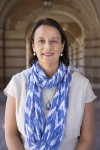When Patricia Turner was a teenager, she thought she would have to work for years at local stores to afford college.
Then, during her senior year, she found out she had scored high enough on a standardized test to receive a regents scholarship, which would fully fund her education at a state college.
“I was flabbergasted,” Turner said. “It still stands out all these years later, because it made all the rest of this (life) possible.”
Turner grew up in a low-income household in Sag Harbor, New York, she said. Her father owned a farm and her mother cleaned houses. Neither of her parents graduated from high school, and she became the first in her family to attend college at the State University of New York, Oneonta. Turner added her experience growing up inspired her to pursue a career where she could help underserved students find success like she had.
At SUNY, Oneonta, some faculty members saw potential in Turner and encouraged her to give back by becoming a teacher, she said. She went on to UC Berkeley for graduate school and became a professor, and then dean and vice provost of undergraduate education at UCLA. On July 1, she was promoted to senior dean of the College of Letters and Science.
“I want to give back to students who don’t have that institutional knowledge about what college means, whose parents don’t know what FAFSA means,” Turner said. “With the right kind of investment, you can create a pathway to educational, social and economic mobility. That’s what happened to me.”
Turner is the first minority to be a UCLA senior dean, said Jean-Paul Renaud, senior director of communications at the College.
“I think I’ve been the first underrepresented minority several times in my career,” Turner said. “You kind of get used to it. I just want to do as good a job as I have.”
As senior dean, Turner hopes to secure more philanthropic donor funding for UCLA and encourage the state to reinvest in the University of California, she said.
“I want each incoming class of students to get at least as good of an education as, if not better, than the people who came before them,” Turner said.
Turner also does research about folklore and quilt history, she said. When she was in high school and college, she wanted to read more about African-American culture but was unable to find enough information about it. She decided to conduct her own social science research to add to the public record for future generations of scholars.
She added her research has also encouraged her to look for ways to understand everyday life.
“When I was asking people about their quilts, the answers provided insight into their lives above and beyond the quilts themselves,” she said. “When they talked about the role quilts played, it became about much more than quilting, such as relationships or their homes.”
She still keeps the first quilt she ever bought in her home and it often inspires her when she needs to tackle an academic, research or administrative problem, she said.
“It was made by one of most impoverished quilters I ever interviewed,” Turner said. “I tell myself if she could finish that quilt, then I can figure this thing out that I’m working on. It’s just a matter of getting it done.”
Erin Standen, a former student of Turner’s who worked with Turner for two years on the Regents Scholar Society said she thinks students should not feel intimidated to speak to Turner just because she is a high level university administrator. She added she thinks Turner takes the time to listen to students and provide thoughtful responses.
She said she still remembers how Turner required her students to visit the special collections in the Charles E. Young Research Library.
“She wanted us to go beyond the internet and get a comprehensive view of a person’s life in history,” Standen said. “There were all kinds of old documents in the university archives that I didn’t know about, especially as a science major. She didn’t want us to leave UCLA without getting the full experience.”
Beatrix Richman, director of development of the division of undergraduate education, said she thinks Turner has the ability to articulate and represent the challenges of first generation college students.
“She often refers to herself as an example of what can happen when bright students who are committed and passionate have the financial resources to succeed,” Richman said.
Turner said she is looking forward to exploring the different aspects of her new position fall quarter. She said she can’t imagine having pursued any career other than an academic one, because she has always loved studying and learning.
“I think I made the best possible decision with my life,” she said. “I still feel like a little girl waiting for school to start again, except from a different vantage point.”
